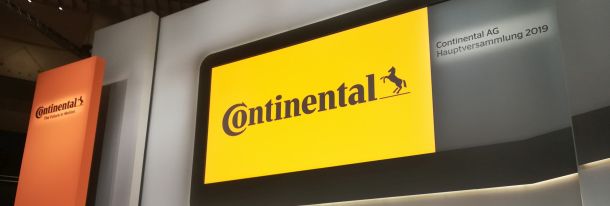
At last week's annual meeting, the German company Continental failed to answer questions relating to the firm's controversial agreement in occupied Western Sahara.
It still appears clear that the German multinational Continental has not tried to obtain permission from the Saharawi people upon engaging in occupied Western Sahara. The company provides key elements for a mineral mine that occupying power Morocco is operating in Western Sahara. In March, WSRW wrote that Continental's contract is set to expire in June 2020.
The rubber giant on 26 April held its Annual General Meeting in the Hanover Congress Center in Germany. Saharawi Khadja Bedati asked the company what it has done to obtain consent for its operations. Read Bedati's statement here. Before finishing the talk, Ms Bedati was interrupted. See here.
The Chairman of the company's Supervisory Board, Prof. Dr.-Ing. Wolfgang Reitzle, did not answer the question. The Chairman stated that the agreement "already contains an obligation with regard to human rights".
He did not answer, however, why the agreement was signed in the first place, as the very agreement itself fails to respect the Saharawi people's rights. Mrs Bedati underlined that in order for such agreement to be in line with international law and the rights of the people of the territory, a consent from the latter has to be obtained. That right was underlined several times by the Court of Justice of the EU from 2016 onward.
WSRW in April published a report about Morocco's exports from the controversial mine, and which Continental's supplies are facilitating.
Here is the full answer of Prof. Dr.-Ing. Wolfgang Reitzle (unofficial translation):
"On Mrs Bedati's question: Do you recognise the Saharawi right to self-determination, and if so, why do you operate in Western Sahara without respecting this right and asking for permission?
Dear Mrs Bedati,
Thank you very much for presenting your request to us. We have been working in Morocco since 2015 and currently have 70 employees. Since 2017 we have been dealing with replacement material for conveyor belts for local use. To this end, a five-year contract has been concluded with our customer, which expires in July 2020. We are familiar with the decision of the European Court of Justice and are aware of the complex situation in Western Sahara. We have committed ourselves to the UN Global Compact for the respect of human rights. We implement this commitment in important internal guidelines and processes. These include in particular the Code of Conduct, which is binding on our business partners.
The second question: Would you be prepared to review your activities in Western Sahara with regard to respect for human rights?
The agreement, which runs until 2020, already contains an obligation with regard to human rights. Please understand that we do not wish to comment on any further details of this agreement. Like many other actors involved, we hope for a peaceful solution to the situation in Western Sahara for the benefit of the Sahrawi people. We will consider your comments as well as those of Western Sahara Resource Watch in our further discussions.”
Original answer, in German:
„Zu der Frage von Frau Bedati: Erkennen Sie das Recht der Saharauis auf Selbstbestimmung an, und wenn ja, warum werden Sie dann in der Westsahara tätig, ohne dieses Recht zu achten und um Erlaubnis zu fragen?
Liebe Frau Bedati,
vielen Dank, dass Sie uns Ihr Anliegen vorgetragen haben. Seit 2015 sind wir mit derzeit 70 Mitarbeitern in Marokko tätig. Seit 2017 geht es um Ersatzmaterial für Förderbänder für den lokalen Einsatz. Dazu ist mit unserem Kunden ein Fünfjahresvertrag geschlossen worden, der im Juli 2020 ausläuft.
Wir kennen die Entscheidung des Europäischen Gerichtshofs und sind uns der komplexen Situation in der Westsahara bewusst. Wir haben uns zum UN Global Compact für die Achtung der Menschenrechte bekannt. Dieses Bekenntnis setzen wir in wichtigen internen Leitlinien und Prozessen um. Dazu zählt insbesondere der Code of Conduct, der für unsere Geschäftspartner bindend ist.
Die zweite Frage: Wären Sie bereit, Ihre Aktivitäten in der Westsahara im Hinblick auf die Achtung der Menschenrechte zu überprüfen?
In dem bis 2020 laufenden Vertrag ist bereits eine Verpflichtung in Bezug auf Menschenrechte enthalten. Bitten haben Sie Verständnis dafür, dass wir uns darüber hinaus nicht zu weiteren Details dieses Vertrages äußern. Wie viele andere involvierte Akteure hoffen wir auf eine friedliche Lösung der Situation in der Westsahara zum Wohl des Volkes der Saharauis. Wir werden Ihre Anmerkungen sowie die der Western Sahara Resource Watch in unseren weiteren Gesprächen berücksichtigen.“
Morocco allocates land in occupied Western Sahara to green hydrogen investors
Morocco’s ambitions to become a global green hydrogen powerhouse are accelerating. Yet, Rabat is allocating land in a territory it does not legally own.
US eyes minerals in occupied Western Sahara
Seeking to position itself as a key supplier of strategic minerals for Western powers, Morocco has signed a new agreement with the United States that covers Western Sahara’s waters and the critical minerals harboured there.
TAQA-Moeve obtains land in occupied Western Sahara
Morocco’s push for green hydrogen has taken a decisive step forward - on territory it does not legally own.
EU-Morocco Statement: autonomy without self-determination, law without lawfulness
A joint statement that came out of last week’s EU-Morocco Association Council asks readers to believe in a fiction: that an undefined autonomy plan imposed by an occupying power can satisfy the right to self-determination, and that respect for international law can coexist with the systematic ignoring of the EU’s own highest court.



